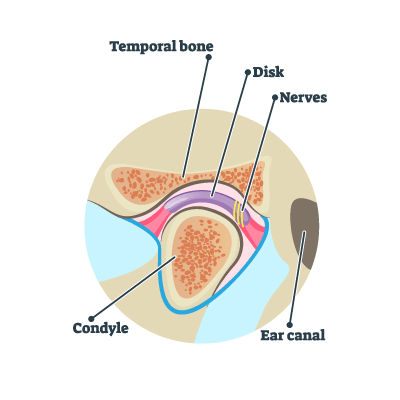
What is TMD?
Temporomandibular Joint Disorder or Dysfunction (TMD) refers to a group of conditions associated with the improper function, inflammation or pain of the temporomandibular joint and surrounding facial muscles and nerves.
The TMJ connects the jaw bone to the skull; it is formed at the junction of the temporal facial bone and the lower jaw bone or mandible, thus the name ‘temporomandibular joint’. There are two temporomandibular joints (TMJ); they are located in front of the ears. Like other joints in the body, they are made up of tendons, ligaments, muscles and cartilage that enable joint movement. The TMJ work together to move the lower jaw to open/close the mouth, chew, speak, swallow or yawn.

The mechanical design of the TMJ includes the rounded ends of the jaw bone (condyles) that move within the recessed sockets of the facial bone. Each condyle glides along a hard tissue articular disc that is connected to the facial muscles and tendons that are responsible for jaw movement.
Normal TMJ function allows the jaw to move hundreds of times per day, smoothly and without pain. When a patient experiences jaw muscle soreness or spasms, facial pain, or has difficulty opening or closing their mouth, TMJ dentist Dr. Leigh Bennett will examine the joints and review radiographic images to look for evidence of Temporomandibular Joint Disorder.
TMD Diagnosis
In addition to jaw and facial pain, TMD can present with a wide range of signs and symptoms. Generally, a diagnosis of TMD may be categorized as:
- Myofascial pain - pain in the muscles, tissues and tendons of the TMJ.
- Arthritis and joint inflammation.
- Jaw injury, dislocated jaw, lockjaw or displacement of the articular disc within the TMJ.
A TMD patient can be diagnosed with one or all of these conditions, along with other medical complications that may be connected to TMD symptoms and pain. Dr. Bennett works closely with medical specialists as necessary to identify and treat health issues related to TMD.
Treatment Options for TMD
Dr. Leigh Bennett supports patients with temporomandibular disorder symptoms at Hartley Bridge TMJ & Dental Sleep Center. Our Macon TMJ and dental sleep medicine facility is dedicated to assisting you with jaw and facial muscle pain, as well as provide oral therapy solutions to assist in the management of obstructive sleep apnea and CPAP intolerance.
Based on her diagnostic findings, Dr. Bennett may recommend one or more treatment approaches for TMD, including:
- A diet of soft foods, applying ice packs and avoiding opening widely, yawning or gum chewing can reduce TMJ strain and inflammation and help reduce TMD discomfort.
- Oral appliance therapy is often recommended for treatment of TMD. Dr. Bennett designs a custom mouth tray (also known as a bite splint or bite guard) that is worn over the teeth to help stabilize and relax the jaw joint and facial muscles.
- Teeth grinding (bruxism) and clenching may be caused by TMD, or, can make TMD symptoms worse. Following a thorough evaluation, Dr. Bennett may prescribe an oral appliance that is designed to both assist with TMD treatment as well as minimize bruxism and clenching.
- Stress can make TMD symptoms worse, or, can be a contributing cause of both TMD and bruxism and clenching. Stress management techniques and stretching exercises for the facial and jaw muscles may be recommended.
- Dr. Bennett may prescribe medications for temporary use to relieve TMD muscle and facial pain.
- Dental infections or jaw tumors can trigger extreme facial pain; Dr. Bennett conducts an oral examination as part of a TMD assessment to rule out dental disease as a factor.
- Referral to medical specialists for evaluation and treatment of other medical conditions that may be connected to TMD, such as arthritis, sinus or ear infections, facial neuralgias or migraine headaches is sometimes necessary.
- Surgery is generally the last option considered. Dr. Bennett or your physician may refer you to an oral surgeon or orthopedic specialist for evaluation for surgical correction of TMJ bone structures or treatment of disease.
Hartley Bridge TMJ & Dental Sleep Center in Macon, GA
Individualized Treatment for Individual Needs
If you have been diagnosed with Temporomandibular Joint Disorder, we know that the battle with pain, combined with an overload of information, can be overwhelming.
We can help you start with the facts: Schedule a New Patient Consultation with Hartley Bridge TMJ & Dental Sleep Center for a thorough analysis and professional treatment recommendations based on your specific needs.